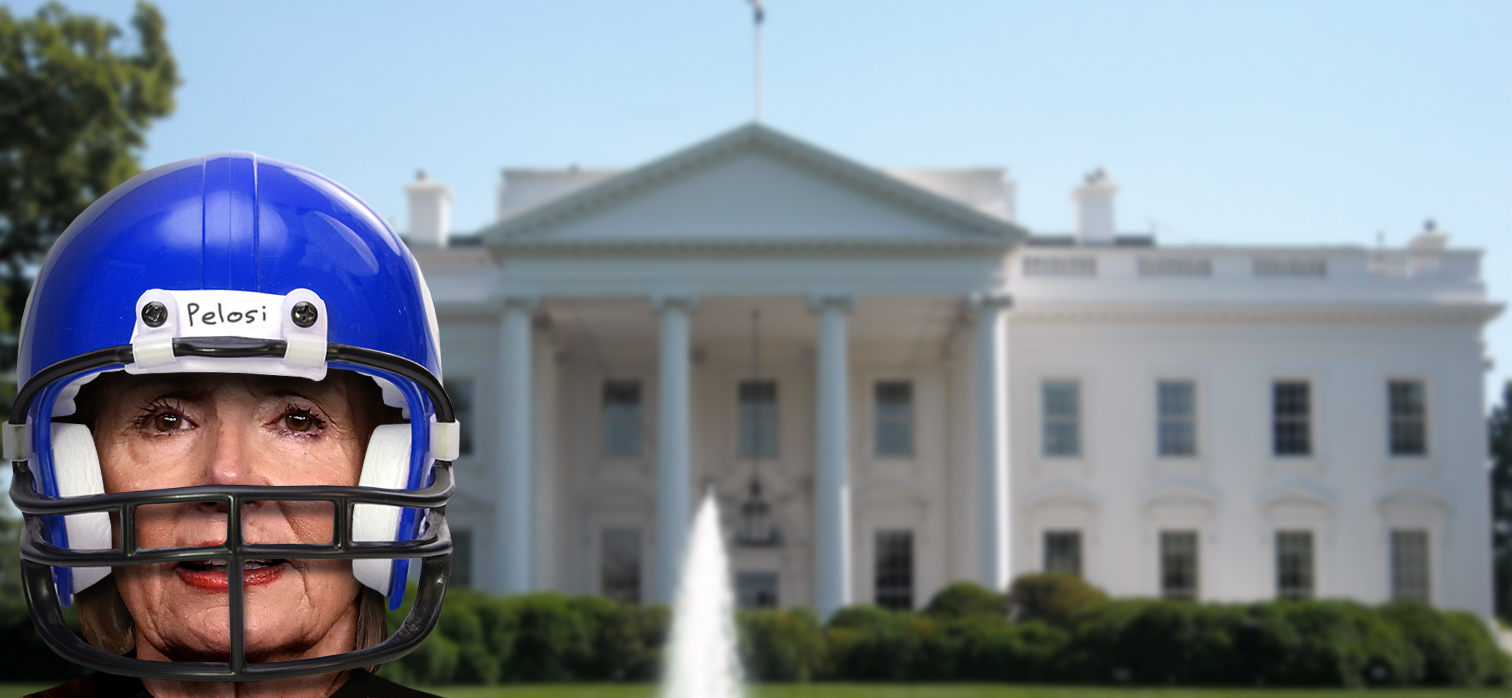How Democrats should tackle Trump in the midterms
Should they hammer Trump's corruption or focus on kitchen table issues? Yes.

There are few things Democrats love more than a bitter internal debate. And in that spirit they're now arguing about what they should be telling voters. Should they be hammering on President Trump's corruption, or homing in on those "kitchen table" issues like the economy and health care that voters always say they care about? Democrats can't seem to decide; here's an article from last Monday with a big picture of Nancy Pelosi entitled "Democrats take aim at Trump scandals in midterm message," and here's an article from two days later headlined "Nancy Pelosi's 2018 strategy: Ignore Trump, focus on the economy."
There's a logic to both approaches, but the best answer to the question of whether they should talk about Washington corruption or everyday concerns is: Yes.
I'll explain in a moment, but first let's look at the case for each. When you ask voters in polls what the most important issue for them is, they're likely to cite the economy, health care, or guns (depending on how many days it's been since the last mass shooting), while Trump corruption generally scores pretty low. If Democrats are going to convince the electorate that they're worthy to govern, they have to show people how they'd improve their lives.
The Week
Escape your echo chamber. Get the facts behind the news, plus analysis from multiple perspectives.

Sign up for The Week's Free Newsletters
From our morning news briefing to a weekly Good News Newsletter, get the best of The Week delivered directly to your inbox.
From our morning news briefing to a weekly Good News Newsletter, get the best of The Week delivered directly to your inbox.
In fact, they've been trying, even if you may not have noticed. Democrats have a whole bunch of concrete proposals under the rubric of "A Better Deal," uninspiring though that might be as a slogan. Sure, few people have read the proposals, but almost no one read the Republicans' "Contract With America" before the 1994 election either. At the moment, it's an answer to the inevitable question, "Oh yeah? Well what do you want to do about it?"
The reality is that even if they win one or both houses of Congress this year, Democrats won't have the opportunity to do anything affirmative for a minimum of two years, until they get a Democratic president who would sign the bills they pass. But it's still important to demonstrate to voters what your values are and what you'd do with power if given the chance. And it doesn't hurt to have that agenda in place so when that day comes, you can get right to work.
There's one more reason to focus on the kitchen table: It seems to have been working really well since Trump got elected. In off-year and special elections Democrats have been performing spectacularly well, and if you look at those races, you'll see candidate after candidate talking about local issues and things like health care. They've benefited greatly from anti-Trump feelings driving Democratic voters to the polls, but their campaigns haven't been about Trump.
That's a reasonable case to stay away from Trump corruption as a campaign issue.
A free daily email with the biggest news stories of the day – and the best features from TheWeek.com
The case on the other side is that right now there is simply nothing more important than Trump's corruption. That means not only the Russia scandal, but everything else: his constant lying, his attempts to obstruct justice, the way he is profiting off the presidency, his attacks on any institution that might hold him accountable, the wave of corporate influence-buying, one Cabinet member after another living lavishly at taxpayer expense, all of it.
Even if it were not politically advantageous, Democrats would have an obligation to talk about the myriad ways Trump is corrupting our government and our politics. We are living in an emergency, even if at times it can be so overwhelming that we grow numb to the latest outrage.
In addition, Democrats have failed to educate the public about the magnitude of the Trump scandals, largely playing defense while the president and his allies relentlessly attack Robert Mueller's investigation. But at some point — maybe even before the midterms — Mueller will finish his work, probably with a round of indictments. When that happens, Republicans will cry that it was all a Fake News Witch Hunt and we should just move on, and Democrats will have to explain why that's the wrong response. If they haven't been forcing the public to think about the substance of the scandal, it will get lost in the he said/she said.
And even if voters aren't saying now that corruption is what they care about, that could just mean they haven't been convinced yet. When Democrats took Congress in 2006, corruption was one of the big reasons why (you might remember the Jack Abramoff scandal). Voters are already predisposed to think Washington is corrupt, and this is an important attack on Trump that can resonate with even some people who supported him in 2016: He said he'd clean things up, and he did just the opposite.
Now it's time for some straight talk. Voters, it's sad to say, are basically ignorant. This is the fact that underlies almost all political campaigning — all those ads, all those mailers, all those debates, all that door-knocking, all those billions of dollars spent.
Think of it this way. If you're reading this article, chances are you care and know a good deal about politics. Does any of that campaigning ever change your vote? Have you seen a political ad and said, "Gee, I was going to vote for the Democrat, but if he really supports giving gay abortion welfare to illegal alien Islamic terror babies like that ad says, I guess I'll be voting Republican this year"? No, you haven't. Because you're not an idiot.
But the people who produced that ad wrote it the way they did because they think it will persuade enough idiots to win them the race. And sometimes they're right. The truth is that if everyone were even reasonably informed, we'd barely need campaigns at all.
But we do, and even if political consultants will tell you your campaign should never be about more than one thing (because voters are supposedly incapable of holding two thoughts in their heads), this year can be the exception. What Democrats need is a division of labor.
At the national level — prominent politicians, party leaders, liberal pundits — it's vital to keep talking about Trump's corruption. Not only is it the right thing to do, it will remind Democratic voters of why they're angry at Trump. That anger is the most powerful force in politics right now, and it needs to be cultivated and activated.
And at the local level, candidates can talk to their voters about health care and the economy and whatever else is on their minds. They can present all the white papers they like. They can persuade voters that choosing them is a vote for policy substance.
Voters may not be geniuses when it comes to politics, but they can probably grasp both of those things: Trump is a crook, and this nice young lady running for Congress in my district seems like she's got a good head on her shoulders. It gives people something to vote against and something to vote for. Which seems like it would cover all the bases.
Paul Waldman is a senior writer with The American Prospect magazine and a blogger for The Washington Post. His writing has appeared in dozens of newspapers, magazines, and web sites, and he is the author or co-author of four books on media and politics.
-
 The 8 best biopic movies of the 21st century (so far!)
The 8 best biopic movies of the 21st century (so far!)the week recommends Not all true stories are feel good tales, but the best biopics offer insight into broader social and political trends
-
 Washington grapples with ICE’s growing footprint — and future
Washington grapples with ICE’s growing footprint — and futureTALKING POINTS The deadly provocations of federal officers in Minnesota have put ICE back in the national spotlight
-
 ‘One day fentanyl will come back — and there will be little anyone can do’
‘One day fentanyl will come back — and there will be little anyone can do’Instant Opinion Opinion, comment and editorials of the day
-
 The billionaires’ wealth tax: a catastrophe for California?
The billionaires’ wealth tax: a catastrophe for California?Talking Point Peter Thiel and Larry Page preparing to change state residency
-
 Bari Weiss’ ‘60 Minutes’ scandal is about more than one report
Bari Weiss’ ‘60 Minutes’ scandal is about more than one reportIN THE SPOTLIGHT By blocking an approved segment on a controversial prison holding US deportees in El Salvador, the editor-in-chief of CBS News has become the main story
-
 Has Zohran Mamdani shown the Democrats how to win again?
Has Zohran Mamdani shown the Democrats how to win again?Today’s Big Question New York City mayoral election touted as victory for left-wing populists but moderate centrist wins elsewhere present more complex path for Democratic Party
-
 Millions turn out for anti-Trump ‘No Kings’ rallies
Millions turn out for anti-Trump ‘No Kings’ ralliesSpeed Read An estimated 7 million people participated, 2 million more than at the first ‘No Kings’ protest in June
-
 Ghislaine Maxwell: angling for a Trump pardon
Ghislaine Maxwell: angling for a Trump pardonTalking Point Convicted sex trafficker's testimony could shed new light on president's links to Jeffrey Epstein
-
 The last words and final moments of 40 presidents
The last words and final moments of 40 presidentsThe Explainer Some are eloquent quotes worthy of the holders of the highest office in the nation, and others... aren't
-
 The JFK files: the truth at last?
The JFK files: the truth at last?In The Spotlight More than 64,000 previously classified documents relating the 1963 assassination of John F. Kennedy have been released by the Trump administration
-
 'Seriously, not literally': how should the world take Donald Trump?
'Seriously, not literally': how should the world take Donald Trump?Today's big question White House rhetoric and reality look likely to become increasingly blurred
